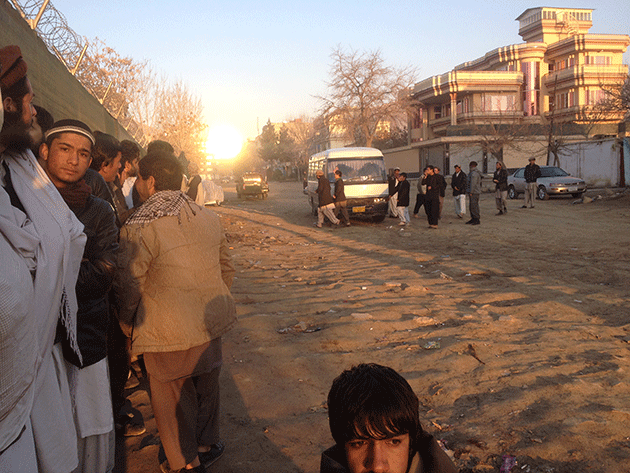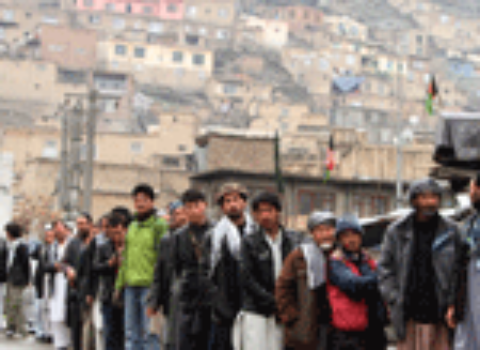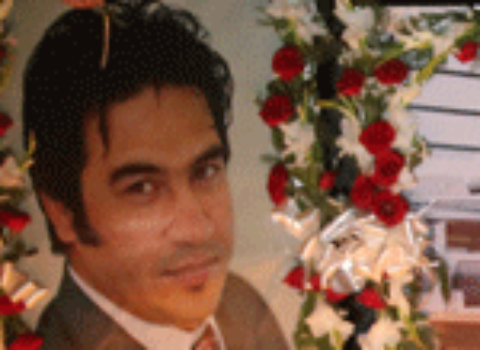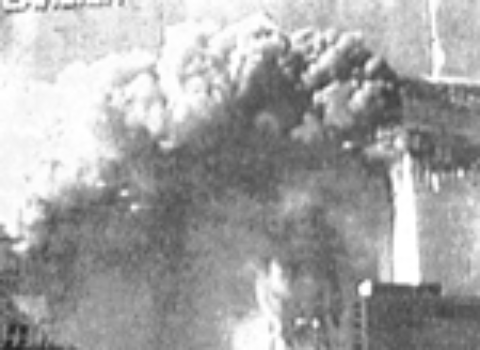The line, against the wall of a girl’s high school in northern Kabul, did not budge for nearly an hour. Eventually I gave up, making my way to the front and asking the young man who was crouched there (as he had been for at least five hours) what time I should come the following day to be sure to get my voter-registration card. “At dawn,” he said. “Come pray the morning prayer here and then wait.”
My friend Qiam and I woke up early the next morning, packed some coffee, apple juice, and energy bars, and drove back to the school, one of three registration sites in the city. When we arrived — at 5:15, nearly three hours before the gates were scheduled to open — already there were about thirty people ahead of us in the men’s side of the line. The crowd behind us grew steadily with the arrival of prospective voters bused in by provincial-council candidates.
For the first couple hours, the mood was good. A policeman kept the line organized, and though people complained, they did so with a certain pride. “I waited till four in the afternoon yesterday. Just as my turn arrived, they said official hours were over, come back tomorrow,” said one man. “I called home to ask for some lunch,” said another veteran of the previous day. “All they sent was rice pudding.” Soon, though, the line began lengthening in front of us as well as behind. Qiam and I tried in vain to get the attention of the policeman, who had gone to his booth to eat breakfast. “Say there’s a suicide bomber — that’ll get his attention,” someone joked.
As the April 5 elections approach and the time allotted for political campaigning — two months for the presidency, one for the provincial councils — comes to a close, there’s been a surge of interest in voter cards. Since registration began last May, nearly 3.8 million new voters across the country have applied — largely because, for the first time since the U.S. invasion in 2001, the incumbent president, Hamid Karzai, is not on the ticket, meaning the race is more or less wide open. This surge has brought the total number of voting cards issued since the first post-Taliban election, held in 2004, to more than 21 million, nearly double Afghanistan’s population of eligible voters. Electoral fraud has been a major concern for years, and this time is no different. (In 2009, about 1 million votes were discarded as fraudulent. In one case, a former electoral official told me, poll workers tabulating votes reportedly opened a box to find the shoe of an overzealous ballot-stuffer.)
Just before eight A.M., police started patting people down and allowing them inside the school compound. The line stalled for a further two hours as dozens of government officials, members of the Afghan National Security Forces, and other influential people were escorted to the front, many emerging with their cards within minutes. The waiting crowd’s irritation was palpable, but at this point the fun was not entirely lost. A young engineer wearing a black suit and a purple shirt and tie disclosed to the people around him that he had been a failed candidate for provincial council the last time around.
“How many votes did you get, Mr. Representative?” someone teased.
“Seventeen hundred and forty-three,” replied the engineer. “But my family didn’t know that I was a candidate — the votes would have been much more if I had told them.”
“And where is your voting card, Mr. Representative?”
“An MP friend of mine took it for his registration and never gave it back to me, the bastard,” said the engineer. (Electoral law requires prospective candidates to present a certain number of voter cards from supporters in order to qualify.) Another hour later, the phone of the man in front of me began playing the theme song from Valley of the Wolves, a popular Turkish soap opera dubbed in Dari. “Can you Bluetooth that ringtone to me?” said Mr. Representative over my shoulder. “I may not get a voter card, but at least I’ll get a ringtone and save myself ten afghanis [about twenty cents].”
As lunchtime drew near and our line still failed to make progress, the anger overflowed. Elderly men tried to rush the classroom where the cards were being issued. “I am old and sick. I can’t stand in line anymore,” said a frail, turbaned man without a single tooth in his lower jaw. “If you’re sick, go be first in line at the hospital,” replied a young man. One of the election workers escorted a mullah to the door of the classroom. Usually clergy are accorded enormous respect in Afghanistan, but this morning the crowd was not having it. “Soldiers give blood,” shouted one person, referring to the dozens of uniformed men who had cut the line. “What does the mullah give?” The mullah entered silently, his head bowed. When he emerged with his voter card, another chant was started: “The unjust mullah! The unjust mullah!” He walked quickly out of the school.
At 11:50 A.M., after more than six hours of waiting and just before the three clerks inside the classroom went on their hour-long lunch break, Qiam and I got our cards. Frustration and exhaustion — partially of our doing, since we’d waited until election eve to register — overshadowed our excitement. Not that the run-up to the elections has been all that politically exciting anyway. None of the presidential candidates seems prepared to address the challenges Afghanistan will face in its first transition of power since Karzai took office. Some fail to realize the enormity of those challenges; others are simply too divisive. Still, the crowd at the school seemed intent on affirming what Afghanistan has lacked in recent decades — democratic continuity — even in the face of lackluster candidates and Taliban fearmongering.
My friends registering on the women’s side later reported that the female security officer at the gate had told each person she frisked that police had intelligence on a possible suicide attack — which was either true or a way of discouraging people from waiting. But as far as my friends could see, no one left without a voter card.






